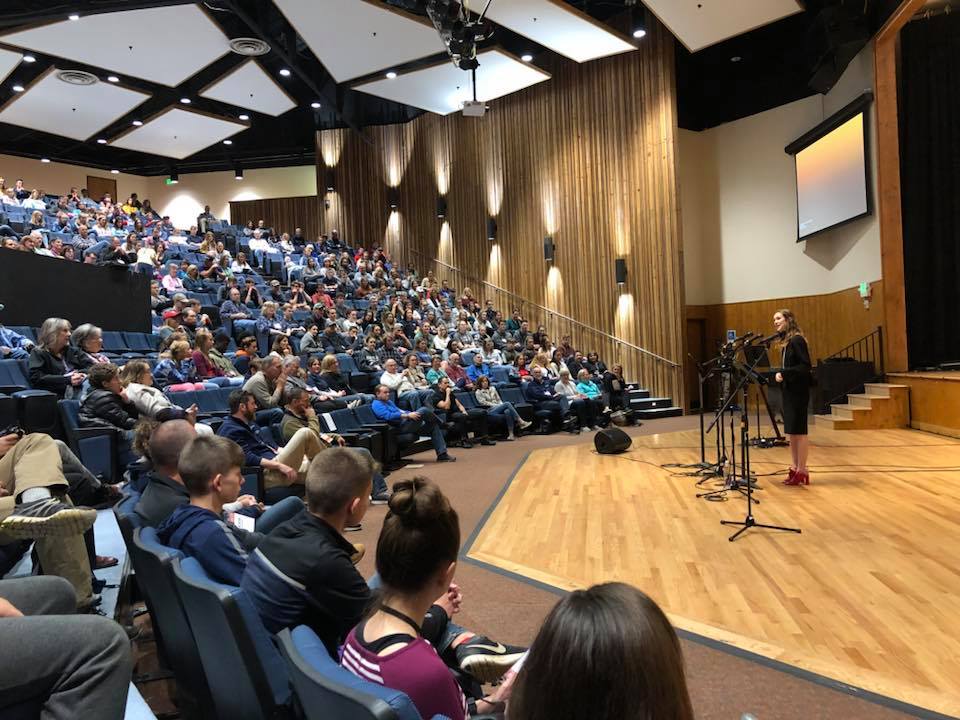
One of our most precious (and important) traditions at LINK is listening to Senior Thesis presentations. Each year, Wilson Hill recognizes two students with the Scott Baker Award for Excellence in Senior Thesis, and each year those students are invited to give their presentation to the entire LINK audience. We have never been disappointed.
Noteworthy is that Senior Thesis students have presented speeches only to an online audience. And yet, every time – every time – we have gathered again at LINK, and it is time for these students to make their way to the podium, they look out into a room filled with hundreds of people, gather themselves, and deliver something truly remarkable and inspiring.
However, I want to stress an unintended consequence of these presentations. As teachers and parents, we are proud, inspired, and likely reaffirmed in the type of education we want for our young people. Rightly so. But I am convinced there are some students – enough of them, anyway – who walk away from the very same presentations with a different leading thought or feeling, the gist of which is something like, “I could never do that.” However eloquent or true or impactful those speeches might have been, I suspect some (maybe even many) students are thinking, “That is only possible for those students, and I am not one of them!”
Maybe so. Maybe there is such a thing as a talent – by which I mean a God-given ability granted only to some – for exceptional speaking on formal occasions, similar, for example, to athletic or musical talent. Maybe some people are “just built that way.”
But affirming rhetorical talent tempts us to misunderstand the entire purpose of Senior Thesis. We all get, for example, that students should learn mathematics, even while saying simultaneously that only some have a unique talent in that subject. In other words, we understand that the point of studying mathematics is not to be an award-winning mathematics student. But after watching an award-winning Senior Thesis speech, we can very easily be tempted into thinking that such notable and inspiring eloquence is the goal of Senior Thesis. We are tempted to think, “If I (or my son or daughter) can’t speak like that, what’s the point?”
Well, let’s ask that exact question. What is the point of Senior Thesis (called Rhetoric 2 at Wilson Hill)?
Too many classical Christian schools have found their starting point in answering that question from the Roman orator Quintillian’s famous statement that the goal of rhetoric is “the good man speaking well.” Whatever Quintillian might have meant by “good,” he did not draw his framework for understanding goodness from the Scriptures. And this makes all the difference in how we understand the goal of rhetoric (and thus of Senior Thesis).
Starting with the assumption that the Bible is not at all silent on rhetoric, why not orient our understanding of the purpose of rhetoric from the biblical worldview, starting with the scriptural exhortation to “speak the truth in love” (Ephesians 4:15)? The biblical and Christian idea of love – not simply as feeling but as action – is the most countercultural commandment given in the Bible, and thus not to be found, much less emphasized, in the classical pagan orators. We speak, in all situations and with all people (“in season and out of season,” as Paul put it to Timothy), not for our own good but for their good – that is, the good of the audience, whoever that might be. This is rhetoric understood self-sacrificially.
This is why we teach that the first rule of rhetoric is “to know your audience.” Whatever I might want to say about a matter, I must begin not with myself but with the other. Whatever I might want to say about a matter, the most important question is, what does my audience (whether one person or a thousand people) need to hear if I am to love them well? If I am to speak the truth in love?
The most important point to see is this: rhetoric, understood rightly and from the Scriptures, is about being human in the full sense of living as God created us to live.
Rhetoric is not for the award-winners; rhetoric is for all those who want to see their neighbors transformed by the love of God. Rhetoric does not just prepare you for speaking in formal settings (though it certainly does that!); it does not just prepare you for the challenges of research and writing at the college level (though it certainly does that!); it does not just prepare you to assume primary responsibility for your own project and bring it to completion on time, thus giving you confidence that you would not have had otherwise (though it certainly does that!). Rhetoric prepares you for a life of loving God and loving your neighbor. This alone must be the high goal, the chief end, or we miss the entire point.
To remind my Senior Thesis students of the true goal of rhetoric, I often return to the prayer found in Psalm 19: “May the words of my mouth, and the meditation of my heart, be pleasing in your sight, O Lord, my rock and my redeemer.” The true pursuit of rhetoric can have no other motivation.